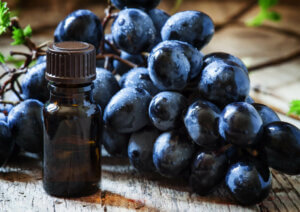Benefits of Grape Extract For Athletes

Athletes need a higher intake of antioxidants than most people. This is because antioxidants help reduce the muscular damage that workouts can cause and can modulate inflammation. To help meet these requirements, there are several dietary strategies that you can put in place. One of them is the intake of grape extract.
Here, we’ll describe the properties and benefits of ingesting this food. However, we’ll also let you know all about the correct way to use it. This isn’t a food that should be consumed in large quantities habitually.
Grape extract is a good source of antioxidants
Grapes contain flavonoids with antioxidant properties known as tannins. When athletes consume these nutrients in dietary doses, it leads to better recovery times. This is according to a study published in the journal The Cochrane Database of Systematic Reviews.
According to the cited article, the consumption of phytonutrients is able to moderately reduce muscular damage and accelerate the process of reconstruction when ingested with the diet. However, they haven’t found clear benefits in the case of supplementation.
On the other hand, using antioxidant supplements is demonstrated to be counterproductive. The supplements can influence cellular and muscular signaling pathways. In this way, they reduce the super-compensation capacity of the athlete. This also reduces the performance increase that’s derived from training.
The recommendation, therefore, would be to ensure that you’re getting a good amount of flavonoids in your diet, but not through supplementation. In this sense, athletes including grape extract in moderate doses in their diets seem to be a smart, effective strategy to help their recovery times.

The cardioprotective properties of grape extract
In addition to its benefits for recovery, athletes who consume grape extract are also helping contribute to greater cardiovascular health. For years now, scientists relate the intake of grapes with cardiac protection. This is why you’ve likely heard recommendations to drink a glass of wine with your dinner as part of a Mediterranean diet. Although keep in mind that this advice is a little out of date.
What is clear is that regularly consuming grapes, such as in an extract, reduces the risk of developing cardiac illnesses both in the short and long term. This is obviously a positive for your health! In addition, the antioxidant property in tannins aids with a delay in aging, which is also something beneficial for athletes.
It’s worth noting that black grapes contain a higher quantity of antioxidants than white grapes. Phytonutrients are mostly pigments that give color. This means that the darker the grape, the higher the flavonoid content. In terms of your wine, this means that you want it as close to the color of actual fruit as possible!
Other extracts recommended for athletes
In the same way that grape extract is recommended for athletes, there are other concentrated fruits that can be beneficial. One example is tart cherry juice or blueberry juice.
While they’re beneficial, it’s important to reiterate that these extracts need to be consumed in moderation. This will help them aid your body in recovery, while not interfering at the same time in the muscle signaling pathways.
An overdose of antioxidants or phytonutrients isn’t recommended for most athletes. This would only be justified in a situation of high competitive stress, where there isn’t enough time to rest between events.

In this case, recovery is prioritized over the ability to adapt. This can be by supplementing antioxidants or by drastically increasing their intake.
Grape extract has benefits for athletes
As you can see, athletes can extract benefits from consuming grape extract. As long as it’s taken moderately, it can be an effective strategy to improve muscular recovery.
This situation can reduce the risk of injury for athletes who are participating in very intense training sessions. Although indirectly, the grape extract will help improve performance. In addition, including vegetables in your diet will guarantee that you’re getting enough phytonutrients for their anti-inflammatory and antioxidant capacities.
Finally, remember that for any diet to be balanced, it has to have foods from all major food groups. This is as important as having a caloric balance.
Athletes need a higher intake of antioxidants than most people. This is because antioxidants help reduce the muscular damage that workouts can cause and can modulate inflammation. To help meet these requirements, there are several dietary strategies that you can put in place. One of them is the intake of grape extract.
Here, we’ll describe the properties and benefits of ingesting this food. However, we’ll also let you know all about the correct way to use it. This isn’t a food that should be consumed in large quantities habitually.
Grape extract is a good source of antioxidants
Grapes contain flavonoids with antioxidant properties known as tannins. When athletes consume these nutrients in dietary doses, it leads to better recovery times. This is according to a study published in the journal The Cochrane Database of Systematic Reviews.
According to the cited article, the consumption of phytonutrients is able to moderately reduce muscular damage and accelerate the process of reconstruction when ingested with the diet. However, they haven’t found clear benefits in the case of supplementation.
On the other hand, using antioxidant supplements is demonstrated to be counterproductive. The supplements can influence cellular and muscular signaling pathways. In this way, they reduce the super-compensation capacity of the athlete. This also reduces the performance increase that’s derived from training.
The recommendation, therefore, would be to ensure that you’re getting a good amount of flavonoids in your diet, but not through supplementation. In this sense, athletes including grape extract in moderate doses in their diets seem to be a smart, effective strategy to help their recovery times.

The cardioprotective properties of grape extract
In addition to its benefits for recovery, athletes who consume grape extract are also helping contribute to greater cardiovascular health. For years now, scientists relate the intake of grapes with cardiac protection. This is why you’ve likely heard recommendations to drink a glass of wine with your dinner as part of a Mediterranean diet. Although keep in mind that this advice is a little out of date.
What is clear is that regularly consuming grapes, such as in an extract, reduces the risk of developing cardiac illnesses both in the short and long term. This is obviously a positive for your health! In addition, the antioxidant property in tannins aids with a delay in aging, which is also something beneficial for athletes.
It’s worth noting that black grapes contain a higher quantity of antioxidants than white grapes. Phytonutrients are mostly pigments that give color. This means that the darker the grape, the higher the flavonoid content. In terms of your wine, this means that you want it as close to the color of actual fruit as possible!
Other extracts recommended for athletes
In the same way that grape extract is recommended for athletes, there are other concentrated fruits that can be beneficial. One example is tart cherry juice or blueberry juice.
While they’re beneficial, it’s important to reiterate that these extracts need to be consumed in moderation. This will help them aid your body in recovery, while not interfering at the same time in the muscle signaling pathways.
An overdose of antioxidants or phytonutrients isn’t recommended for most athletes. This would only be justified in a situation of high competitive stress, where there isn’t enough time to rest between events.

In this case, recovery is prioritized over the ability to adapt. This can be by supplementing antioxidants or by drastically increasing their intake.
Grape extract has benefits for athletes
As you can see, athletes can extract benefits from consuming grape extract. As long as it’s taken moderately, it can be an effective strategy to improve muscular recovery.
This situation can reduce the risk of injury for athletes who are participating in very intense training sessions. Although indirectly, the grape extract will help improve performance. In addition, including vegetables in your diet will guarantee that you’re getting enough phytonutrients for their anti-inflammatory and antioxidant capacities.
Finally, remember that for any diet to be balanced, it has to have foods from all major food groups. This is as important as having a caloric balance.
All cited sources were thoroughly reviewed by our team to ensure their quality, reliability, currency, and validity. The bibliography of this article was considered reliable and of academic or scientific accuracy.
- Ranchordas MK., Rogerson D., Soltani H., Costello JT., Antioxidants for preventing and reducing muscle soreness after exercise. Cochrane Database Syst Rev, 2017.
- Merry TL., Ristow M., Do antioixidant supplements interfere with skeletal muscle adaptation to exercise training? J Physio, 2016.
This text is provided for informational purposes only and does not replace consultation with a professional. If in doubt, consult your specialist.








